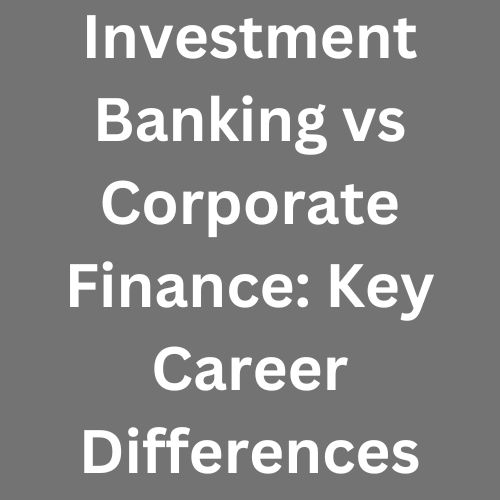
Investment Banking vs Corporate Finance
Introduction to Investment Banking vs Corporate Finance
Welcome to Hub World, we will be discussing about investment banking vs corporate finance, their core functions, team structures and hierarchy, difference in organizational structure, nature of work and client interactions, work life balance and job demand, and industry outlook and job opportunities.
Key Functions and Objectives of Investment Banking vs Corporate Finance
What is Corporate Finance Goals
Corporate finance goals entails making the organization value grows and stakeholder gain while choosing prudently with money and for stockholders making most money possible. It is used for maintaining liquid assets or dealing with risks or increase in wages and financial security long term attainment.
What is Investment Banking Goals
Investment banking goals entail generating income for underwriting and trading securities including assisting with strategic and financial planning for clients. It is used for raising funds for the government and businesses also assisting in issuing of securities and trading. It provide help in acquisitions and mergers through consulting service.
Comparing Core Functions of Investment Banking vs Corporate Finance
Financial analysis involves assessing financial performance or assessing investment opportunities and examining financial documents. Private placements or initial public offering (IPOS) and debt issuance are some ways capital funds are raised for corporate finance departments and investment banks. Optimization of capital structure or restructuring of mergers and acquisition firms, and financial advisory services are some of the strategic advice offered by the investment banks. Valuation tools and financial modeling techniques or investment techniques are some of the disciplines to determine the value of companies. Within an organization the finances are manage internally by the corporate finance while financial services are provided by the investment banking for clients outside the company.
Team Structures and Hierarchy of Investment Banking vs Corporate Finance
Corporate Finance Teams
Corporate finance teams entails the supervision of chief financial officer (CFO) making every financial activity. Specific areas such as the treasury management or mergers and acquisitions and financial planning are focused on by the directors and vice president as the senior financial professionals. Analysts and managers handle the financial management process and different aspects also the complexity and organization size is determined by the team structure. The proper financial management or competent judgement and effective communications are formed by the framework.
Investment Banking Teams
Investment banking teams entails high positions in an organization such as the managing directors or associates or analysts and vice presidents. Analysts are involved in the daily duties who help as the basic level as a professional also vice presidents are responsible for the client relations and several transactions. Associates engage directly with clients or oversee deal executions and in financial research with extensive experiences. To provide strategic guidance, directors are involved in conducting business and managing customer relations as well as in charge of teams. The overall team management or client relationship management or business strategy are responsibilities of managing directors. Each person is crucial for the development of the company and to deliver excellent services for the team.
Difference in Organizational Structure
Large corporations or bank are usually found in corporate finance involving a hierarchical structures of multiple levels of management. It ensures the worth of the organization is maximize and the financial administration makes an effort to guarantee efficient. The top management is consolidated to make decisions including sections or several groups. While in investment banking focuses on the M&A transactions and capital raising with a greater autonomy given to each team. The goods or industry is sometimes segmented based due to the horizontal organizational structure. The top priorities are the financial advising services from the revenue creation and execution of transactions.
Nature of Work and Client Interactions of Investment Banking vs Corporate Finance
Corporate Finance Work Environment
Corporate finance work environment entails the headquarters of the company or regional majority of the time. External stakeholders or operational or legal and accounting all collaborate together to achieve a goal. Awards success and quick paced settings put high pressure on candidates during difficult financial circumstances. Some of the skills required are teamwork or analytical skills and quick thinking.
Investment Banking Work Environment
Investment banking work environment is refer to as a quick paced work or competitive and a demanding environment with hard conditions and long working hours. The departments consist of coordination and cooperation to interact with clients or political bodies or financial institutions and companies. Some of the requirement are travel frequently or analyze well and ability to communicate including financial transactions or mergers and capital raising as the advise services.
Differences in Client Relationships
Corporate finance clients includes assistance and financial advice of the daily operational businesses required including offering wide range of services capital structure or risk management or financial analysis and project financing. Investment banking entails investment opportunities or underwriting services or seeking information for governmental organizations about the capital market or affluent people and institutional investors. Customers raising capital get their assistance from investment bankers through advisory services or merger and acquisition and on equity and debt initial public offering (IPOs) issues. In other country, legislation are in large number due to investment banking including facilitating mergers and acquisitions or advising clients and underwriting securities offerings.
Work-Life Balance and Job Demands of Investment Banking vs Corporate Finance
Corporate Finance Hours and Stress
Corporate finance hours and stress involves financial quarter closure or reporting on financial budgeting statement as examples of experts working longer hours in corporate finance during busy periods. Important financial decisions or pressing deadlines or intricate financial transactions are results of high levels of stress from the daily activities. The business finance stability are ensured from the stressful tasks such as financial forecasting or risk management or mergers and acquisitions and overseeing investor relations. It is important to compliance criteria and meeting regulatory as well as providing timely and accurate financial information.
Investment Banking Hours and Stress
Investment banking hours and stress refers to working Monday through Friday 9 am to 5 pm on beyond demanding and prolonged hours. During busy periods it can be between 80 – 100 hours a week including demanding clients and stringent deadlines. The competition in this field is high for the generating results and carrying out continuous necessity.
Comparing Work-Life Balance
During hectic periods in investment banking, working long hours is a must which exacerbates burnout and stress. Better work life balance and greater flexibility are allowed at non financial organizations by corporate finance positions for predictable and regular work hours. Work life balance are often disturbed in investment banking due to work related travel for extended period of time from being away from family and home. A more stable way of living and less travel requirements for professionals in corporate finance while investment banking requires frequent travel and extended work hours. It is essential for both domains to have commitment and perseverance to achieve the objectives of a business or company.
Industry Outlook and Job Opportunities of Investment Banking vs Corporate Finance
Corporate Finance Job Market
Corporate finance job market contains raising money or risk management or budgeting and decision making about investments including economic conditions or financial literacy need and business trends which are based on modification. Some of the roles in corporate finance job market are financial analysts or investment bankers or financial managers and corporate treasurers. The firm financial principles need to be understood and financial decisions are made by competent market participants. To enhance career prospects with industry advancement, staying current and securing relevant credentials is essential also the financial assets of an organization need evaluating and overseeing.
Investment Banking Job Market
a formidable rivalry and high earning potential
one requirement is the necessity for recent graduates from top universities with strong academic qualifications
affected by adjustments made to the global economy and financial markets.
in times of economic expansion and stable financial markets, there can be more advantageous career prospects.
the right combination of technical ( financial analysis, modeling) and soft abilities ( teamwork, communication) is required.
to agin access to jos, networking and establishing contacts in the industry are crucial
maintaining current market trends and skill development is essential.
Future Trends in Both Fields
Digital transformation ensures the process is more simplified and efficient with the breakthrough in technology for artificial intelligence or machine learning and automation. Ethical investing and renewable energy are related to supporting projects for the organizations as a major area to focus on the emergence of sustainable finance. Mediating agreements is used to complete challenging transactions for businesses through the help of investment banking during COVID-19 for growing merger and acquisition. The risk management capabilities is strengthen with a stricter regulatory adherence and state of the art data to improve risk management in investment banking. To obtain a competitive edge, it is necessary to spot pertinent trends and analyze vast amount of data which is important in data analytics. New spaces are open for capital and trend when investment banks expand their presence due to emerging markets as economic power shifts.
READ MORE ON Investment Banking vs Corporate Finance
SEE MORE ON Budgeting and Forecasting: Essential Techniques for Success

